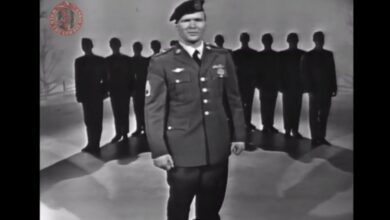I roam this lonely path, shadows linger near, With memories of love, only echoes here.
Marty Robbins, born Martin David Robinson on September 26, 1925, in Glendale, Arizona, is an iconic figure in American country music. Growing up surrounded by the rich musical landscape of Phoenix, where radio stations played an array of country music, cowboy tunes, and populist genres, Robbins developed his musical identity early on. His love for music blossomed during his childhood, leading him to perform at local events and school functions. After serving in the U.S. Navy during World War II, Robbins committed himself to his musical dreams, embarking on a remarkable career marked by significant accomplishments and artistic evolution.
Stepping into the music world in the late 1940s, Robbins quickly gained recognition for his powerful baritone voice. What set him apart from his peers was his skill in crafting vivid narratives within his lyrics. The 1950s and 1960s were particularly fruitful for Robbins, during which he released a string of hits that have become enduring classics. Notably, “El Paso” not only soared to the top of the charts but also highlighted his storytelling ability, weaving a tale of desire, love, and tragedy that resonated with listeners of all backgrounds. These hits solidified his position as a significant figure in the evolving realm of country music.
Robbins’s unique approach to songwriting drew heavily from his own experiences. His life on the road—filled with both exhilaration and solitude—often inspired themes of longing and isolation in his work. His 1968 release, “I Walk Alone,” is a prime example, offering a profound exploration of the emotional complexities faced by performers. The song articulates a poignant reflection on loneliness, resonating with artists who grapple with balancing their dedication to their craft and personal relationships. Robbins skillfully captured the tension between public acclaim and private solitude, a narrative that many in the audience could relate to deeply.
Musically, “I Walk Alone” fuses traditional country sounds with contemporary elements, illustrating Robbins’s readiness to evolve as an artist. The song features a rich arrangement that blends fiddles and electric guitars, highlighting the authenticity of its country roots while embracing the innovative production techniques of the time. This combination enhances Robbins’s emotive vocal delivery, ensuring that the song’s themes resonate with genuine impact and emotional depth.
Robbins’s legacy is further enhanced by his cross-genre explorations, which allowed him to reach a wider audience. By embracing various musical styles, including rockabilly and folk, he showcased his versatility while staying true to his roots. His pioneering blend of genres paved the way for future artists who have cited him as an inspiration, emphasizing his role in shaping the trajectory of country music.
The lasting appeal of “I Walk Alone” attests to Robbins’s artistic significance. Many artists have covered the song over the years, underscoring its importance within the music community. Its universal themes evoke emotions that transcend time, maintaining relevance and resonating with listeners regardless of changing societal contexts. The song’s lyrics reflect sentiments of hope and self-reflection, showcasing its adaptability and emotional richness.
Throughout his illustrious career, Robbins received numerous accolades, including several Grammy Awards and honors from the Country Music Association. With an extensive catalog of over 500 recorded songs, his prolific output reflects his unwavering dedication to songwriting. Tracks like “I Walk Alone” exemplify his unique approach to storytelling, merging engaging melodies with introspective lyrics that invite listeners to reflect.
Robbins’s live performances further illustrated his strong connection to his fans. He had a remarkable ability to convey the emotional weight of his studio recordings on stage, captivating audiences with his charm and creating an intimate atmosphere as he shared his life experiences through music. The emotional highs and lows portrayed in songs like “I Walk Alone” resonated profoundly in live performances, allowing listeners to engage with his artistry on multiple levels.
The themes Robbins explored in his music, particularly in “I Walk Alone,” encapsulate fundamental human experiences. Concepts of loneliness, resilience, and yearning resonate deeply across different walks of life, and Robbins adeptly articulated these emotions within the framework of country music. His work serves as a powerful reminder of the importance of storytelling in song, highlighting its capacity to heal and impact listeners in deep and transformative ways.
Marty Robbins’s contributions to music, especially through songs like “I Walk Alone,” not only showcase his individual talent but also demonstrate his lasting influence on the country genre. His ability to navigate complex emotions and express them through lyrics and melodies continues to resonate with audiences globally, ensuring his legacy endures among the greats of American music. His journey from Glendale, Arizona, to the pinnacle of the music industry inspires aspiring artists to chase their dreams and convey their own truths through their art.





